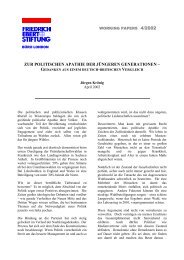Where Now for European Social Democracy? - Policy Network
Where Now for European Social Democracy? - Policy Network
Where Now for European Social Democracy? - Policy Network
Create successful ePaper yourself
Turn your PDF publications into a flip-book with our unique Google optimized e-Paper software.
DOMINIQUE STRAUSS-KAHN 19has qualifications that make them attractive to new employers.Indeed, these professional changes are often an opportunity <strong>for</strong> themto accelerate their professional development, renegotiating theirresponsibilities and their salaries. The poorly qualified worker has onlythe internal recognition of the quality of his or her work in a particularcompany. This recognition cannot be redeemed to impress a futureemployer: he or she is condemned to be unemployed, or at best, tobegin again from nothing. For the unskilled worker, professionalchange is a rupture, sometimes definitive, in his or her career.One must take charge of this rupture and guarantee the period oftransition between losing one job and finding another. In La Flamme etla Cendre, 2 I call this the mutualisation of the risks of professionalmobility. In the past, with professional rights, it was the job that wasprotected. It should be the individual that is protected, not the job.The practical solutions are obviously the most difficult to put intopractice: this is a new social right. We must build a real ‘professionalsocial security’. We <strong>European</strong> social democrats must all work togetherwith our social partners to accomplish this.To create real equality of opportunity, and a guarantee of socialpromotion <strong>for</strong> all, we must invent ‘empowering socialism’Intervening at the heart of the system of production to limitinequalities is not enough. We must also intervene further upstream,since we have seen that ordinary citizens do not have the means toensure their professional success. There are intelligent workers andchildren in both rich communities and in deprived neighbourhoods.Nonetheless, statistically, the <strong>for</strong>mer succeed, and the latter fail.‘Personal capital’, that is to say individual origins and their visiblesigns – if one is black, white or brown – the family context , and thesocial-urban environment all determine personal accomplishment.From this point of view, the market does not create new inequalities –it makes them apparent. It simply continues, in terms of financial andprofessional success the inequalities of the cradle.This is why I propose the construction of an ‘empowering socialism’to allow the reality of social mobility. This rests on two principles.



